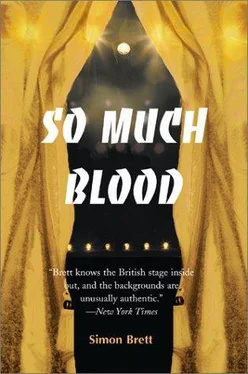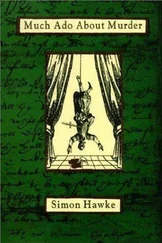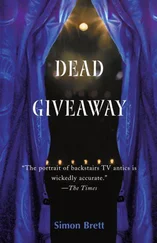Simon Brett - So Much Blood
Здесь есть возможность читать онлайн «Simon Brett - So Much Blood» весь текст электронной книги совершенно бесплатно (целиком полную версию без сокращений). В некоторых случаях можно слушать аудио, скачать через торрент в формате fb2 и присутствует краткое содержание. Жанр: Классический детектив, на английском языке. Описание произведения, (предисловие) а так же отзывы посетителей доступны на портале библиотеки ЛибКат.
- Название:So Much Blood
- Автор:
- Жанр:
- Год:неизвестен
- ISBN:нет данных
- Рейтинг книги:3 / 5. Голосов: 1
-
Избранное:Добавить в избранное
- Отзывы:
-
Ваша оценка:
- 60
- 1
- 2
- 3
- 4
- 5
So Much Blood: краткое содержание, описание и аннотация
Предлагаем к чтению аннотацию, описание, краткое содержание или предисловие (зависит от того, что написал сам автор книги «So Much Blood»). Если вы не нашли необходимую информацию о книге — напишите в комментариях, мы постараемся отыскать её.
So Much Blood — читать онлайн бесплатно полную книгу (весь текст) целиком
Ниже представлен текст книги, разбитый по страницам. Система сохранения места последней прочитанной страницы, позволяет с удобством читать онлайн бесплатно книгу «So Much Blood», без необходимости каждый раз заново искать на чём Вы остановились. Поставьте закладку, и сможете в любой момент перейти на страницу, на которой закончили чтение.
Интервал:
Закладка:
‘Of course. So Willy was rehearsing all weekend?’
‘No. That’s a good example of what I mean. He rehearses on Saturday with his usual bad grace. Sunday-no sign of him. Monday he is not there and I am so furious I break the rehearsal and I go up to his house to drag him back-by force if necessary.’
‘Was he there?’
‘Oh yes, he’s there. Calmly decorating. Plaster dust everywhere, paint brushes, so on and so on.
‘Did you get him to rehearsal?’
‘Yes, till mid-afternoon. Then he slipped off again when we had a break.’
‘Hmm. Perhaps he wanted to get back to his decorating.’
‘Yes. Or to the girl.’
‘Girl?’
‘Yes. When I finally got him out on the Monday morning, he called out “Goodbye” to someone upstairs.’
CHAPTER SIX
In they go-in jackets, and cloaks,
Plumes, and bonnets, turbans and toques,
As if to a Congress of Nations:
Greeks and Malays, with daggers and dirks,
Spaniards, Jews, Chinese, and Turks Some like original foreign works,
But mostly like bad translations.
By Sunday 18th AugustEdinburgh was beginning to feel the Festival. Over-night the city was full of tourists-tweedy music-lovers on leisurely promenades, earnest Americans decked with rucksacks and guide-books, French and Japanese drawn by the twin attractions of culture and Marks and Spencer pullovers. The residents who had not escaped on holiday wore expressions of resignation, hardened to the idea of their streets clogged with ambling foreigners, their early nights troubled by returning revue audiences and the distant massed pipes and drums of the Military Tattoo.
Because that Sunday was the day when it all started officially. In the words of the Festival brochure, ‘The twenty-eighth Edinburgh Festival will be opened with a Service of Praise and Thanksgiving in St Giles’ Cathedral on Sunday 18th August at 3 p.m. Later, starting from the Castle Esplanade at 9.45 p.m., relays of torch-bearing runners will light a bonfire on Arthur’s Seat.’
And in the little halls of Edinburgh on that Sunday morning would-be cultural torch-bearers blew earnestly at the smoulderings of what was in many cases incombustible material. Experimental and university groups realised that their rehearsal time was running out and put on a spurt to justify the extravagant claims of their publicity. There were dress rehearsals for at least a dozen ‘funniest revues on the Fringe’, some twenty ‘revolutionary new plays’, and three or four ‘new artistic concepts which would flatten the accepted barriers of culture’. If all these ambitions were realised, British theatre would never be the same again.
In the Masonic Hall in Lauriston Street Charles Paris was trying to realise more humble ambitions and finding it hard work. The lighting technician he had been allocated was a fat and contemptuous youth, whose blue denim had faded and dirtied to the colour of sludge. He was known as Plug, and Charles found it difficult to call anyone ‘Plug’.
It had been made clear that, considering the exacting demands of creative amateur theatre, there was not going to be much time or effort left for him, a mere professional. ‘Um… Plug?’ he said exploratively, ‘I wonder about the chances of moving the back-projector round. If it stays there, I’m going to be masking the slides.’
‘That’d mean moving the screen too,’ Plug grunted accusingly.
‘Yes, it will.’
‘Can’t be done. Haven’t got the extension leads.’
‘Can’t you get them?’
‘Shouldn’t think so.’
Charles bit back his anger. It was difficult dealing with amateurs. In a professional context, no problem; he could have bawled the guy out, justified because a service that was being paid for was not being provided. But the amateur relies on goodwill and there did not seem to be much of it in evidence.
So he gritted his teeth and played stupid, apparently bowing to Plug’s technical expertise and working the youth round till he did what was required as a demonstration of his abilities. It was important, Charles had gone to considerable trouble to have slides made of Hood’s woodcuts. They had originally been printed with the poems and the crude humour of the pictures extended the range of the verse. In a one-man show it is important to give the audience as much varied stimulus as possible.
By application of simple child psychology he got the back-projector and screen moved and started a run. It was not easy. With only two stage areas in use, the lighting plot was simple. But Plug refused to rehearse the cues on their own, saying that he would pick them up on a full run. Then, in spite of the carefully marked-up script that Charles had given him, he proceeded to get every single effect wrong.
The one benefit of the run was that it tested Charles’ knowledge of his words, because whether he moved to the table or the lectern, there was a guarantee of total darkness on that area. And whenever he turned to the back-projection screen, he was confronted either by a blank or the wrong slide.
It was also a useful concentration exercise. In the darkness beyond the stage people kept wandering in and out. Plug greeted them all loudly and conducted irrelevant conversations at the top of his voice. Charles was ignored like a television in the corner of the room.
The show limped to its close. As he stood at the lectern to read the final Stanzas, ‘Farewell, Life! My senses swim…’, he was amazed to find the light was actually where it should be. It had taken the whole show to get one cue right, but at least it offered hope. Encouraged, he put more emotion into the poem. It approached its end with the dying fall he had intended.
‘O’er the earth there comes a bloom Sunny light for sullen gloom,
Warm perfume for vapour cold-’ then, before ‘I smell the Rose above the Mould’, the pause held long and dramatic.
Too long. Too dramatic. Plug snapped the lights out before the line was delivered.
Charles’ reserves cracked. ‘Oh, for Christ’s sake!’
‘What’s up?’ Plug grunted from the darkness.
‘That’s not the cue. There’s another line.’
Plug did not seem unduly concerned. He brought up the house lights. ‘Never mind.’
‘And then, after the last line, there’s supposed to be a three-second pause and a five-second fade down to black.’
‘Oh.’
‘It’s clearly marked in the script.’
‘Yes.’
Charles decided there was little point in concealing his feelings. ‘That was pretty abysmal.’
Plug nodded sympathetically, unaware that the comment referred to him. ‘Hmm. Perhaps you need more rehearsal.’
‘I think it’s you who needs more rehearsal. None of the cues were right.’
Plug’s silence indicated that this was an unworthy attack on his life work. Charles continued, ‘So let’s have one run-through of just the cues and then do the whole show again.’
‘There’s not much point.’
‘Why not? The show opens tomorrow.’
‘Yes, but I won’t be doing the lights then. I’m only here for the rehearsal.’
Charles tried to find out what would be happening about his lights in the actual show from the Company Manager, and Brian Cassells was confident that everything would be all right. Charles, who found Brian’s confidence increasingly unnerving, was not convinced.
‘Oh, incidentally, Charles, will you be going down to the Fringe reception?’
‘What’s that?’
‘At five o’clock. Royal Mile Centre. It’s sort of to launch everything. You know, Press’ll be there and all that.’
‘Then I’ll certainly come.’ Any chance of publicity must be taken. He was not too optimistic of the ‘DUDS of the Fringe’ poster bringing audiences flocking to see him.
Читать дальшеИнтервал:
Закладка:
Похожие книги на «So Much Blood»
Представляем Вашему вниманию похожие книги на «So Much Blood» списком для выбора. Мы отобрали схожую по названию и смыслу литературу в надежде предоставить читателям больше вариантов отыскать новые, интересные, ещё непрочитанные произведения.
Обсуждение, отзывы о книге «So Much Blood» и просто собственные мнения читателей. Оставьте ваши комментарии, напишите, что Вы думаете о произведении, его смысле или главных героях. Укажите что конкретно понравилось, а что нет, и почему Вы так считаете.












